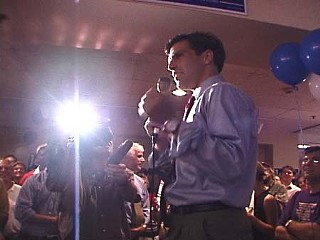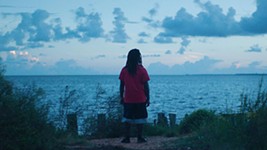Democracy's Feet of Clay
AFS Documentary Tour presents Can Mr. Smith Get to Washington Anymore?
By Anne S. Lewis, Fri., Oct. 3, 2008
Herewith the second of three pre-election docs presented this fall by the Austin Film Society that examine how the political process can subvert the democratic ideal. In his first feature doc, the terrifically titled Can Mr. Smith Get to Washington Anymore?, filmmaker Frank Popper shows us in how many ways the decks are stacked against a political rookie who, for the very best of reasons, decides to run for office. Jeff Smith, a 29-year-old Wesleyan graduate and instructor at Washington University in St. Louis, was just one of 10 whothrew his hat into the ring for the 2004 Democratic primary for the U.S. House seat vacated by Dick Gephardt. The most formidable of his opponents, who included state legislators (and, just to up the name confusion quotient, yet another "Smith," also a Washington U prof), was Russ Carnahan, a ho-hum state legislator who also happened to be the son of popular late Governor Mel Carnahan (who died in a plane crash during a 2000 run for U.S. Senate and was elected posthumously; his wife, Jean, was subsequently appointed to take his place). What candidate Jeff Smith was up against was the fact that in politics, name recognition is huge; in Missouri, the Carnahan name was analogous to Kennedy.
Smith was just the kind of guy – smart, articulate, energetic, and a hardworking advocate for the disenfranchised, who made up the majority of his district – we'd like to see more of in politics.Alas, with no war chest and an enthusiastic, altruistic, but inexperienced campaign team, not to mention a skeptical mom and grandma who believed that his time would be far better spent getting his doctorate, he had some obstacles.Popper follows Smith'sgrassroots, hard-on-the-shoe-leather-and-cell-phone-minutes campaign and keeps us on the edge of our seats for the duration of the film. Along the way, everyone learns a thing or two about the pragmatics of the politics game. I won't ruin the ending for you.
Austin Chronicle:How did you get interested in this project? Did you know Jeff Smith beforehand?
Frank Popper: I was sickened by Bush's reckless foreign policy and his rush into war, and one day I had a phone call with my father about it, and he could hear the steam coming out of my ears, and he said: "You're a filmmaker. Why don't you get it off your chest and make a documentary?" ... One day I was at a booksigning event in downtown St. Louis, and there was this guy, Jeff Smith, working the crowd of a couple hundred people, and he came up to me and said: "Hi, I'm Jeff Smith. I'm running for Congress." I had heard of this Smith, who seemed to be capturing some attention, but since there were two Smiths and both were teaching at Washington University, I wasn't sure which Smith this was, so I said, "I think I've heard of you." Jeff said, "Yeah, you and about 35 other people." Total conversation was 20 seconds long, but I immediately liked his demeanor, and he had a sparkle in his eye, and I sat down and said to the woman sitting next to me, "I think I'm going to make a documentary about that guy." One of the reasons Jeff got into the race was that he, too, was profoundly disturbed by the way Bush went into war, and one of the central points of his campaign was to attack Bush on the war and his foreign policy.I knew I had found my subject.
AC: Your first-time doc experience, filming Smith's campaign, sort of parallels his maiden run for office. Did it go as you expected?
FP: There was only me with a camera, so I couldn't be everywhere at the same time. I had to make choices on the fly – do I stay with Jeff or do I hang back at campaign headquarters, or do I go to a staff meeting or to a political forum? – lots of stuff to shoot, but I could only be in one place at a time.I was flying by the seat of my pants. After a while, I began to realize that Jeff was usually in or near the eye of the storm, so I chose to spend the majority of my time with him.
I didn't know what to expect. I had never been behind the scenes of a political campaign before, so, like most of my work, it was really a journey of discovery. I just had to make sure that while I was discovering stuff, I was keeping the shots in focus, getting good sound, and hoping to be where the action was as much as possible. I was holding up as my modelD.A. Pennebaker's The War Room, and I remember telling my wife at the end of the day, "My god, I can't believe the footage I'm getting." It seemed to me at the time that from a story standpoint, what I was getting appeared to be more of an emotional roller coaster than what I had recalled seeing in The War Room.
Surprises?Witnessing Jeff Smith's campaign from the inside was an emotional roller coaster unlike anything I had experienced before. And I think the surprises unfold pretty readily in the movie as you watch it.Artie Harris, Jeff's communications director, told me once when I lowered the camera after some drama that had just unfolded, "We have bigger ups and downs in one day than most people have in a year." And I think that's true. I remember thinking that my challenge as a filmmaker was to make sure that those surprises that I was witnessing made it to the screen in a way that would be as powerful for the audience as it was for me.
AC:What would you like the viewer to take away from your film?
FP: This film is really a microcosm, in many ways, of what is happening right now on the national level.It's thestory of how our American political election system is broken. The majority of voters don't pay attention, and if they do, most wait until the closing weeks of a campaign to tune in.Most of the corporate media don't do a very good job of covering the issues that will have a profound effect on the voters. Our country faces some of the most difficult and complex problems: Our foreign policy, economy, and our health-care system are in shambles, and yet it is possible to spend tons of time and column inches on dumb stuff about who said what about "lipstick on a pig." It's a sad state of affairs that it takes doomsday on Wall Street to put this kind of political conversation in perspective. It's the way that campaigns game the system, and much of the corporate media are willing to play along. The political establishment makes it nearly impossible for fresh voices to be heard. The money that's needed to be raised and spent to run a campaign is off the charts. Political dynasties and name recognition are worth so much more than talent. If you've got name recognition, you've automatically got a huge advantage over your lesser-known rivals, whether you're even qualified to run.
AC:Any surprising reactions to the film?
FP: I am amazed at the number of conservatives and Republicans who send Jeff Smith, a liberal Democrat, letters and e-mails saying that they don't agree with many of his positions but who go on to praise him for his strength and courage and to offer their support the next time he runs for office.I think this says something about how people can be attracted to a candidate in spite of his or her positions on the issues and might offer some insight into why so many Democrats supported McCain in 2000 and why so many Republicans support Obama in 2008.
The AFS Documentary Tour presents Can Mr. Smith Get to Washington Anymore? on Wednesday, Oct. 15, 7pm, at the Alamo Drafthouse at the Ritz. Tickets are $4 for AFS members and $6 for the general public. For more information, visit www.austinfilm.org.









